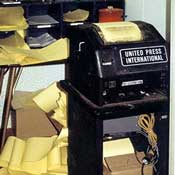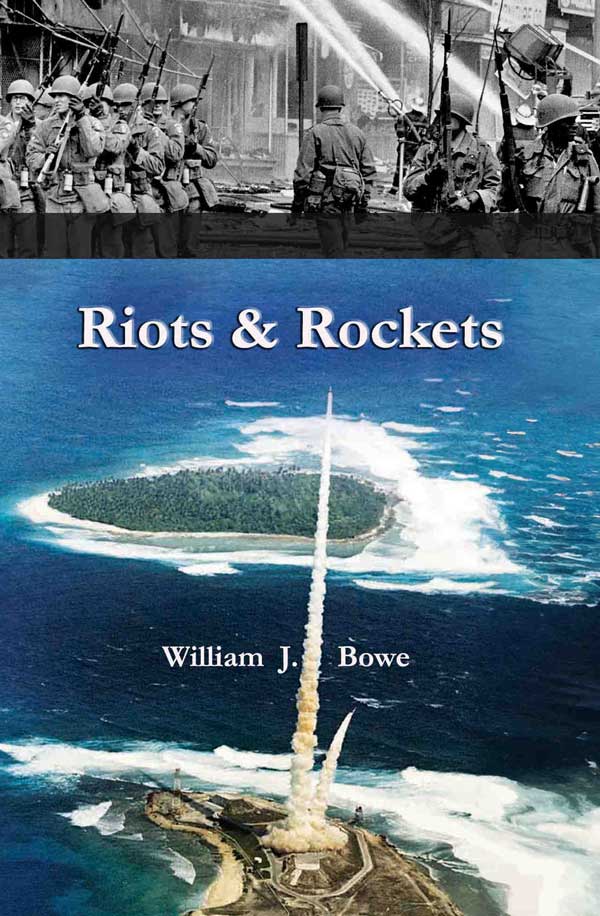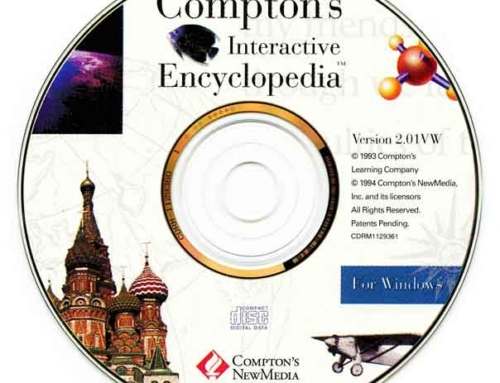Subchapters
UPI’s Bankruptcy Unfolds with a Shock

Luis Nogales and Douglas Ruhe
It has never sounded quite right when I tell people that as a result of my legal advice, UPI declared bankruptcy. But that’s what shortly happened. Kenny and other UPI senior executives followed Nogales’s abrupt departure and resigned.
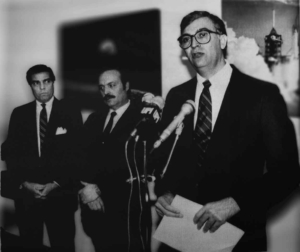
1985 Luis Nogales, CEO, announcing purchase of UPI by Mario Vazquez Rana and Joe Russo
As predicted, after many previous close calls, paychecks around the world finally began to bounce. Correspondents in Asia and Europe lit up the internal UPI wire with queries as to how they would get back to their homes in the U.S. if the company could no longer afford to buy their tickets home. UPI bureau rent parties were organized in some bureaus. In late March 1985, the dust had settled sufficiently so that Time magazine reported recent developments this way:
In the nearly three years since Nashville investors Douglas Ruhe and William Geissler acquired ailing United Press International from E.W. Scripps for $1, they have slashed costs, reduced staff and cut wages 25 percent. For a time, the medicine seemed to work. When U.P.I. announced a $1.1 million profit in the fourth quarter of 1984, its first gain in 23 years, the owners predicted profits of $6 million in 1985. That view was overly optimistic. Last week, with payroll checks bouncing and losses again mounting, Ruhe and Geissler agreed to step aside as part of a deal to save the firm. Under the new plan, they would retain some 15 percent of the stock but relinquish all control of the news service. U.P.I. President Luis Nogales, who was fired by Ruhe just four days before the agreement, will return to run the company. The terms also call for U.P.I.’s trade creditors to forgive the bulk of its $23 million debt in exchange for a 30 percent to 40 percent interest in the firm; most of the remaining shares will be divided among the staff. The creditors, however, may not accept the deal. And even if they do, further cost-cutting moves will be needed if U.P.I. is to survive in the lengthening shadow of the Associated Press.
I had my own personal concerns. Five years before our son Andy had been born prematurely and his medical bills had topped $100,000. Fortunately, most of this amount had been covered in the ordinary course by my employer’s health insurance policy. Cathy was pregnant again, and again at risk of giving birth early. As feared, our second son, Patrick, was born prematurely in mid-April 1985, and by the end of the month UPI filed a bankruptcy petition in the federal district court in Washington, D.C. With Pat in Vanderbilt University Medical Center’s intensive neonatal care unit, Cathy and I were again watching enormous medical expenses pile up daily.
When I learned that UPI had stopped paying its health insurance premiums and that the insurance carrier had cancelled its policy coverage, it was a blow. I had thought for some time that the company might go belly up, but I had never thought it might take me with it.
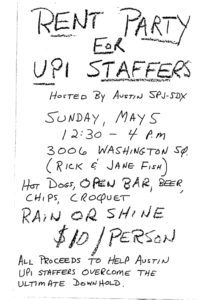
UPI Austin Bureau Rent Party
We were not the only ones potentially out of a safety net. Among the hundreds of UPI employees caught short by the bankruptcy filing, some were in the midst of cancer radiation treatments, and others were facing necessary surgical procedures. The trade creditors of the company really took a bath. Thankfully, not all humanity was lost in this commercial debacle. U.S. Bankruptcy Judge George Bason stepped up to the occasion with the creditors later, and sufficient funds were set aside so that the health insurance of all the employees was retroactively reinstated. God bless them!
The bankruptcy proceeding unfolded in the E. Barrett Prettyman Federal Courthouse in Washington, D.C., where former President Donald J. Trump 38 years later pleaded innocent of charges related to his alleged role in the January 6, 2021, attack on the US Capitol.
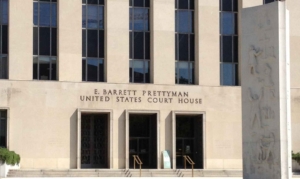
Prettyman Federal Courthouse, Washington, DC
I began flying every Monday from Nashville to the Courthouse and to UPI’s new offices at 14th and U Streets, NW. Saturday and Sunday would be a welcome family weekend back in Brentwood, notwithstanding the fact that for many weeks much of this time would be spent in Pat’s neonatal intensive care unit.
This travel went on during the summer as the Bankruptcy Court looked into the many questionable dealings of Ruhe and Geissler. By September, a Mexican newspaper owner named Mario Vazquez Rana, with a Texan junior partner named Joe Russo, emerged to buy UPI out of bankruptcy.
In November 1985, Time Magazine quoted me on the sale of UPI and UPI’s future:
Said UPI’s Vice President William J. Bowe, “It will be a recapitalized news organization and will be able to get back to being scrappy and competitive.”
I don’t think I’d made such a bad prognostication since May 1970 when I told the Under Secretary of the Army’s military aide that the student demonstrations after the Kent State shootings would be relatively short-lived. As it turned out, before long UPI made a roundtrip through bankruptcy court.
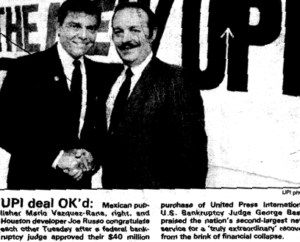
1986 Mario Vasques Rana and Joe Russo
With the seemingly successful reorganization of UPI just completed, I got a call out of the blue from a Chicago headhunter who was looking for a lawyer with publishing experience to head up Encyclopaedia Britannica’s law department in Chicago.
I pursued the job for the great opportunity it was and ended up being chosen for the General Counsel opening. I later learned that over many months there were more than 20 other candidates considered for the position before Britannica’s long time President settled on me as the final choice. As 1986 began, I was flying from Nashville into Chicago during the week instead of to Washington, D.C. Until my family joined me, I lived in a one-bedroom apartment not far from Britannica’s offices near the Art Institute of Chicago. That spring we bought a house in Northbrook, a suburb north of Chicago. It was well located to take advantage of the special-needs schooling Andy was about to embark on and that son Pat never required.
With the family settled, I was ready to dig in my heels and take on the much bigger challenge of serving as General Counsel of Encyclopaedia Britannica.


